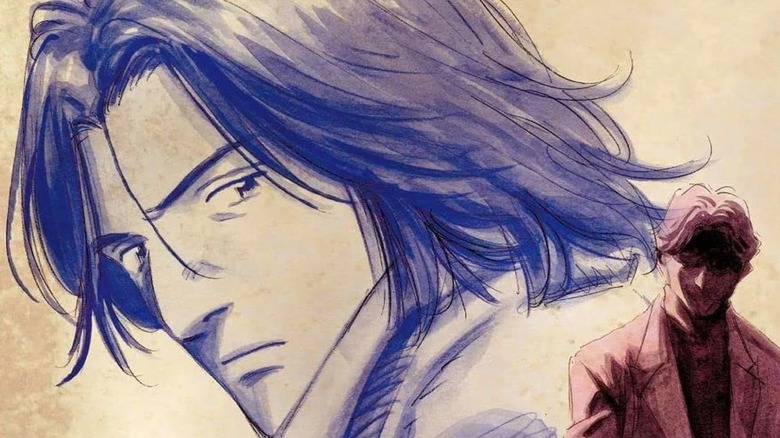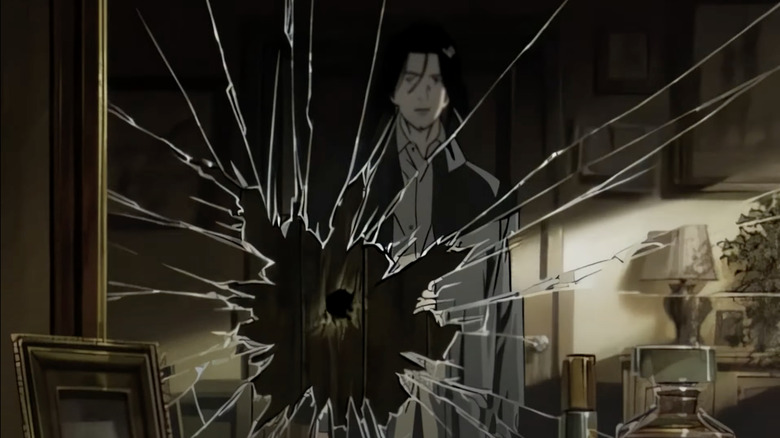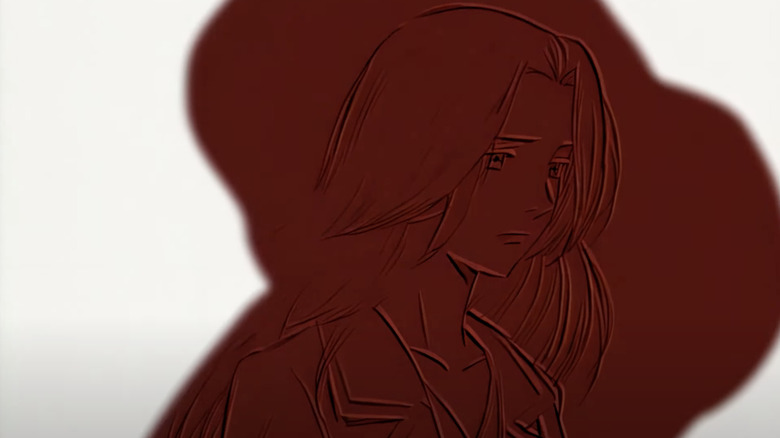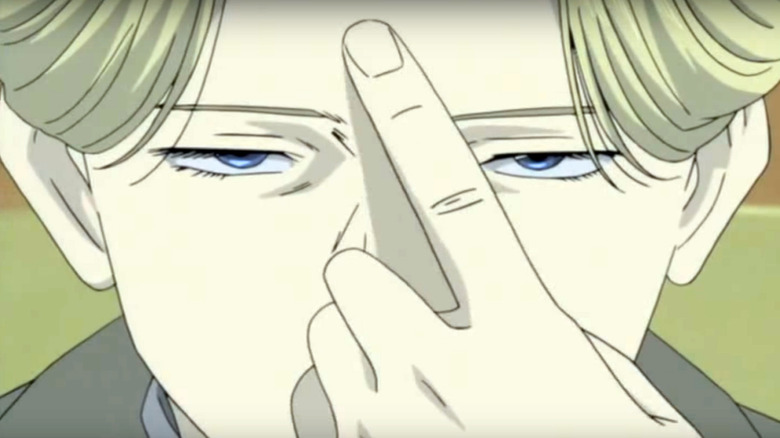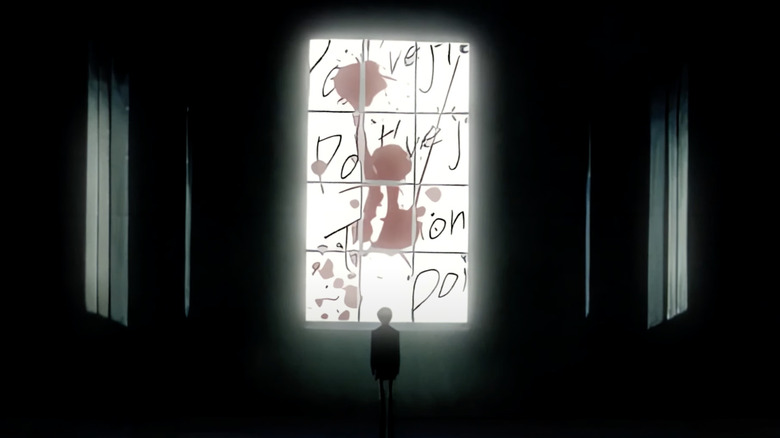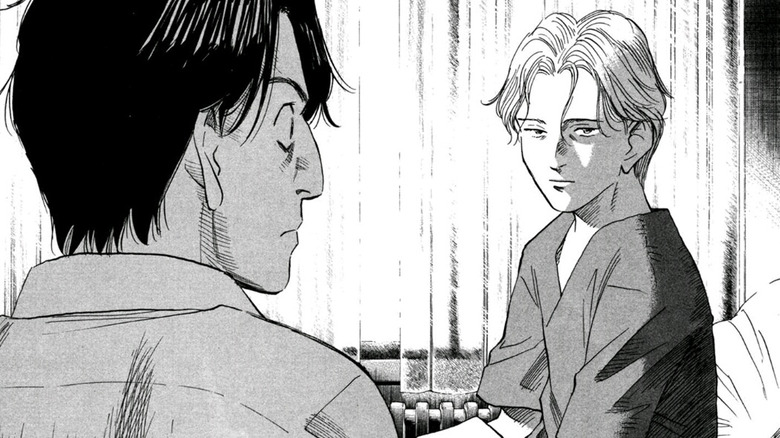Park Chan-Wook Almost Adapted This Classic Manga That Guillermo Del Toro Also Pitched
Adapting manga/anime to live-action almost always feels like a fool's errand. Many have tried, few have succeeded, many more don't even make it to the big screen. One adaptation cast into development hell several times is Naoki Urasawa's thriller "Monster."
"Monster" begins in Germany during 1986, shortly before East/West reunification. Dr. Kenzo Tenma, a Japanese immigrant, is a top neurosurgeon in Düsseldorf. Humble and good-hearted, the doctor actually cares about his patients' well-being, not just money and prestige. Ordered by Hospital Director Heinemann to let 10-year-old orphan Johan Liebert die and save a local politician instead, Tenma disobeys. He saves the boy, but it costs him his engagement (to Heinemann's venal daughter Eva) and his professional future. That is, until Heinemann is poisoned while Johan disappears.
In 1995, Tenma learns Johan grew up to be a prolific serial killer; he killed his adoptive parents, Heinemann, and many more since. Despite the Hippocratic Oath he swore, Tenma decides he must correct the mistake he made in saving this monster's life. Tenma traverses Europe, searching for clues to Johan's location and the mystery of his past. Along the way, he is followed by Inspector Heinrich Lunge, who believes Tenma is responsible for Johan's murders, and Anna Liebert aka "Nina Fortner," Johan's amnesiac twin sister.
162 chapters of "Monster" were published in "Big Comic Original" from 1994 to 2001. Acclaimed domestically and internationally, the series was adapted as a 74-episode anime by Madhouse, airing on Nippon TV from 2004 to 2005. A live-action adaptation has had less luck getting off the ground, though. Among those who have tried, at different times, are Park Chan-wook and Guillermo del Toro.
Olson's Monster
A live-action American version of "Monster" was first announced in 2005, when New Line Cinema acquired the film rights. "Big Comic Original" publisher Shogakukan, Inc. was slated to executive produce. A few months later, it was confirmed that screenwriter Josh Olson would be penning the script. This was a match made in heaven. Olson had just adapted the graphic novel "A History of Violence" into an Oscar-nominated screenplay. While Dr. Tenma and Tom Stall are quite different characters, the conflict of their respective stories both revolve around evil faces from their past.
Unfortunately, no news about the project came after that. While it wasn't officially canceled, years of silence meant it clearly wasn't happening. The official word only came down in 2022 when Olson shared some details on Twitter. According to him, "some complicated rights issue blew [the project] up." It's unclear what this issue was; friction between New Line and Shogakukan sounds plausible, but remains speculative.
The more exciting detail Olson shared is who might have directed New Line's "Monster": Park Chan-wook.
Park's Monster
In the mid 2000s, Park was already established as a filmmaker in his home of Korea, then "Oldboy" skyrocketed him to international fame. According to Olson, though, "Monster" was of interest to Park and he approached New Line, rather than the studio trying to cash in "Oldboy."
There's a lot of overlap between "Oldboy" and "Monster." Park's film was based on a twisty thriller manga by Garon Tsuchiya and Nobuaki Minegishi (the film moved the setting from Japan to Korea). While Oh Dae-Su (Choi Min-sik in Park's film) lacks Tenma's moral fibre, he's also an everyman protagonist who must unravel a mystery and confront a sinister face from his past. Urasawa's art often employs wide framing for maximum impact. Park too has a penchant for wide shots; even the visual language of the story was written for him.
Had New Line's "Monster" gone through, it would've been Park's English-language debut. Since it fell through, he went back to Korea and expanded his wheelhouse. In 2006 he directed the unconventional romcom "I'm a Cyborg, But That's OK" then in 2009, he helmed the vampire film "Thirst." He would ultimately make his Hollywood debut eight years after "Monster" fell through with 2013's "Stoker." Meanwhile, a different master filmmaker took interest in adapting "Monster."
Which format to adapt?
When Olson was announced to write "Monster," the report mentioned he would also write a treatment for a sequel. Clearly, New Line had plans for "Monster" to be more than one film. Even so, another reason the project reportedly fell apart is that it became "too sprawling."
To adapt Urasawa's manga into a single film, you wouldn't need a writer — you'd need a butcher. "Monster" is a sprawling story, with twists upon twists, settings stretching from Munich to Prague, and so much backstory it would sink a two hour feature like an anchor. Olson admitted that trying to compress it into even two films was "absolute murder" for him.
The way the series jumps around POVs is also non-conducive to a movie format. While Tenma is the lead, he intermittently fades from focus while other characters take the reign. Nina, Lunge, and Eva recur from beginning to end and the manga never stops bringing in new characters. Later introduced ones include Dr. Julius Reichwein, a psychologist who assists Tenma in unraveling the mystery of the Liebert twins, and Wolfgang Grimmer, an eerie yet friendly journalist with a connection to Johan's childhood.
Urasawa drew on memories of watching "The Fugitive" as a child to create "Monster." The parallels between Tenma and Dr. Richard Kimble couldn't be more obvious; both characters are surgeons hunting a murderer while on the run from the law. While that series was successfully adapted into a two hour film, said film used only the premise of the series and featured a different, self-contained narrative. A film adapting "Monster" would have to do the same.
With these disadvantages, it makes sense that when Guillermo del Toro tried to adapt "Monster," he pitched it as a TV series instead of a movie.
Del Toro's Monster
In 2013, Deadline reported that del Toro was working with HBO to adapt "Monster." The pilot would be directed by del Toro and written by Steven Thompson, known for his work on "Doctor Who" and "Sherlock." Don Murphy and Susan Montford of Angry Films and Gary Ungar of Exile would produce.
Reportedly, Urasawa needed to be swayed after New Line's film fell through. The apparent strength of del Toro's pitch isn't surprising. If anything, "Monster" is an even better fit for del Toro than Park Chan-wook. A major theme of "Monster" is nature versus nurture. To highlight this, the series explores ways that children were mistreated by institutions and orphanages within the Soviet bloc; Johan himself is a product of one of these. Del Toro masterfully explored the scars that dictatorships leave on children in "The Devil's Backbone" and "Pan's Labyrinth."
Del Toro has an affinity for fairy tales and such allusions are common in "Monster" too; after all, it's set in Germany, homeland of the Brothers Grimm. One of the most important clues about Johan's past is a picture book called "The Nameless Monster," while the Liebert twins are implicitly compared to Hansel and Gretel. And, even though "Monster" can be horrifying, it's really rather idealistic. Tenma's philosophy, that all lives are worth saving, wins out over Johan's belief that death is the natural state of things. This worldview fits a romantic like del Toro. Unfortunately, as del Toro told Latino Review in 2015, HBO passed. Del Toro added that they were pitching it to other studios and it was "likely" to come out in 2016, but that turned out to be far too optimistic a prediction.
Why Monster fits live-action
Despite the hurdles "Monster" has faced, del Toro has said he is still trying "every single year" to see the series through. Screenwriter Zack Stentz has also expressed interest in adapting the story. The question is though, when so many manga/anime adaptations fall flat, is a "Monster" live-action series even worth pursuing? I'd argue the series has some important aspects that make a live-action version tenable.
Unlike many other manga/anime, "Monster" is set in the real world. Anime often takes place in fantasy realms and that's why the stories are better when they stay animated. Hand-crafted art, whether animation or comics, can better stretch imagination's limits than live-action filmmaking can. In "Monster," though, even the unrealistic parts are still within the realm of live-action cinema's capabilities.
Then there's the characters. Manga/anime characters are drawn in stylized fashions. Their long-spiky hair styles don't translate to live-action at all and they wear colorful outfits that look like cosplay when placed against a down-to-earth background and palette. In "Monster," though, Urasawa draws his characters like real people. Each one has a distinct, imperfect face, with features from large noses to double chins. The cast covers a wide range of body types too; plenty are overweight but that's never used for cheap comedy. Even the conventionally attractive characters like Tenma and Eva are realistically beautiful, not the flawless specimens you often see in anime. The only exceptions are Johan and Nina, who are meant to look inhumanly perfect.
The "Monster" anime will be coming to Netflix in the near future. Netflix is not shy about producing live-action anime and has a working relationship with del Toro. They could be the partner he needs to bring Urasawa's tale to live-action, so long as they leave del Toro and Urasawa's visions uncompromised.
